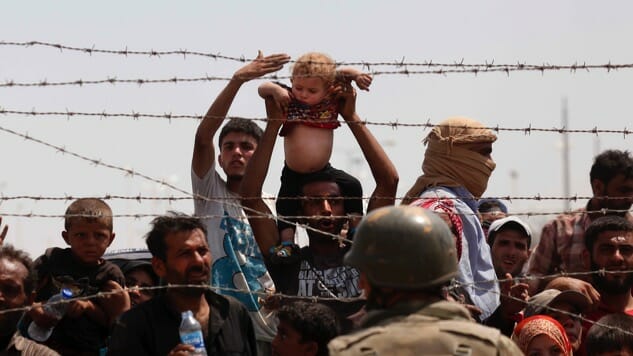You Know They Refused Jesus, Too: How a Refugee Gets to America
Photo by Gokhan Sahin
One of the last things a refugee does before getting the OK to come to America is take out a loan. Not just because being in debt is the American way of life, but because the United States does not pay for a refugee’s airfare. They must sign a promissory note, agreeing to pay back the amount in full on a zero interest loan. Most people, both for and against the resettlement process, do not know this at all. They are presented with phrases like refugee camp and extreme vetting, turning the process of resettlement into a to-do list. But resettlement is not a to-do list. It is a grueling ordeal, filled with uncertainty and fear. Fear that you’ll be turned away, that you won’t make it through the vetting process, and fear that you might not make it in America. After upwards of four years of extreme vetting, all America says is you can live here. After that, you’re on your own.
The process as we know it is not a simple one. The New York Times places it at twenty steps, beginning by registering with the United Nations and ending with a security check at the destination airport. This explanation can be a little reductive and imprecise. In order to register with the United Nations, you must first leave your home and flee your country. Most Americans—though not all—cannot possibly understand the impetus to pack up everything they can and leave, to leave their homes, their jobs, everything they’ve built and saved for and go to a refugee encampment where they will live huddled in conditions akin to those of a music festival on the last day. Only then will they register with the United Nations to explain why a refugee camp and the distant possibility they will be resettled was enough to leave everything they knew.
In the grand scheme of resettlement, a refugee must have a legitimate reason for leaving. In fact, they won’t even be considered a refugee until they have described a legitimate fear for staying in their homes. Many times they leave because where they lived had turned into a war zone, but also because they fear retribution for political stances or persecution for their religious beliefs. Whatever the reason they may have for leaving, they are not a refugee until it has been determined they cannot go back for fear of violence. The 1951 Refugee Convention gives explicit definitions of who may be considered a refugee. That 1951 document is essentially a Constitution for Refugees and the States (Nations) that resettle them, granting rights and setting provisions for what the relationship should be like between Refugee and State. These rights are guaranteed no matter what nation they are referred to including rights to practice their religion and a right to work. It also binds the refugee to the laws of the nation.
This means that if they are referred to the United States, a refugee is bound to the laws of the United States. If they are referred to the United States, they will have an interview with the State Department. This is followed by multiple screenings and interviews. In a Vice News short, one refugee who resettled in Texas described the process between interviews as “focusing on if [his] answer would be different.” The facts and paperwork would be researched, fingerprints scanned, and even in some cases foreign surveillance groups akin to our CIA would be contacted. This process would be culminated in an extensive interview with Homeland Security who must sign off. If all these things matched up, if after months of no contact the stories matched up and nothing could be found by the different agencies vetting the refugee, then they must submit to health screening and cultural orientation classes “to give an image of the United States.”
-

-

-

-

-

-

-

-

-

-

-

-

-

-

-

-

-

-

-

-

-

-

-

-

-

-

-

-

-

-

-

-

-

-

-

-

-

-

-

-








































